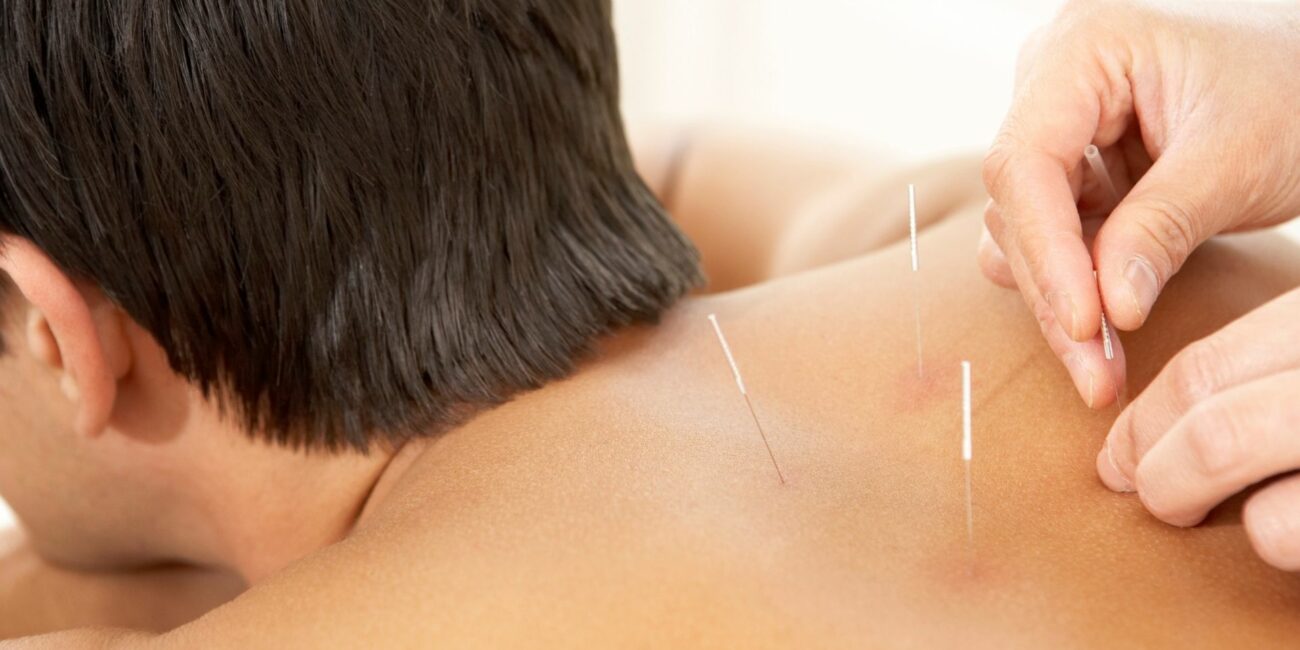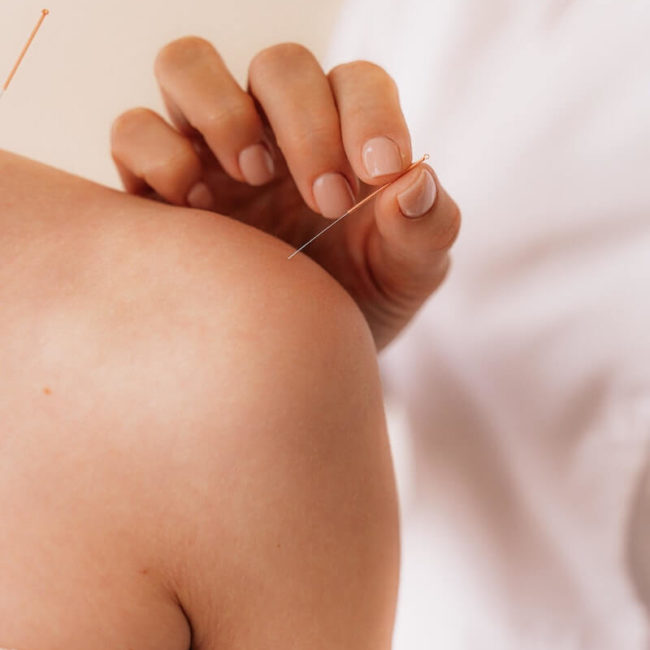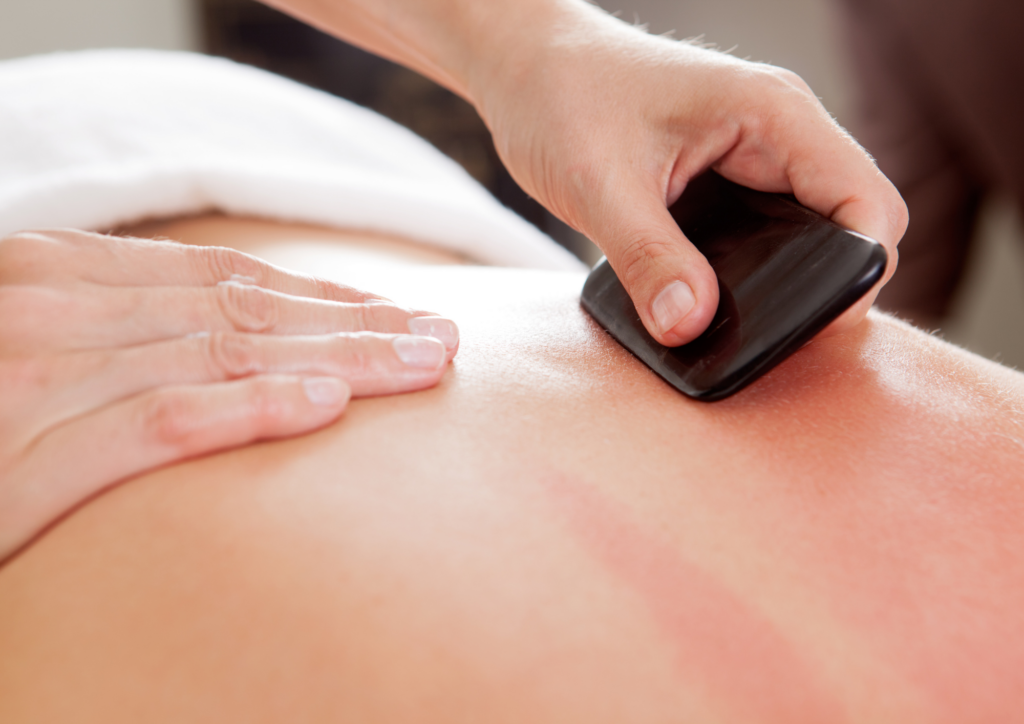ACUPUNCTURE CONSULTATION

The most practiced method in Traditional Chinese Medicine (TCM), acupuncture involves stimulating specific areas of the body with very fine needles on precise points known as meridians. Its objective is to restore the body’s energy balance by enhancing the flow of ‘Qi’ energy within these meridians.
"Acupuncture" at la Clinique Naturelle with Eric Zhao, and Chunhui Yu Bangerter (Helen) ASCA and RME certified therapists.
The applications of acupuncture:
- Digestive system: diarrhea, constipation, bloating, belching
- Nervous system: stress, insomnia, anxiety, migraine, overwork, fatigue
- Respiratory and lymphatic system: common cold, sinusitis, asthma, hay fever
- Gynecological system: amenorrhea (absence of periods), dysmenorrhea (period pain), irregular cycle, premenstrual syndrome, infertility, pregnancy and postpartum
- Muscular system: low back pain, back pain, tendonitis, torticollis
- Cardiovascular system: hypertension
- Urinary system: cystitis, incontinence
- Weight loss
- Hormonal issues: Puberty, menopause
- Food allergies

What is acupuncture?
Acupuncture is a major discipline of traditional Chinese medicine that dates back over two thousand years. For the ancient Chinese, there is a set of channels in the physical body that connect the organs to each other, like an electronic map. These channels are referred to as acupuncture meridians.
An energy called Qi, in Chinese, flows through these meridians and nourishes the whole body. If the energy is blocked and no longer circulates, the organs and cells are no longer supplied according to their needs.
Several factors can cause imbalances or blockages of the Qi, thus triggering symptoms or even pathologies. These factors can be of various origins such as accumulated emotions, inappropriate diet, overwork or weather conditions.
The goal of acupuncture is to fluidify and rebalance the circulation of energy in order to nourish the cells and organs.
Recent studies on acupuncture have shown that it has the effect of releasing endorphins, corticosteroids, serotonin and other neurotransmitters from the central nervous system.
How does your acupuncture session unfold?
A session of acupuncture with Eric ZHAO
His assessment:
Eric begins the session with an assessment, during which he examines the patient to determine energetic imbalances. Visually, he checks the patient’s tongue, eyes, complexion, and ears. Then, he checks the pulse and performs palpation on the abdomen.
Next, he takes time with the patient to discuss and determine the consultation objectives.
His treatment:
Eric places the needles and allows the patient to relax to fully benefit from the stimulation of acupuncture points. He accompanies his patients throughout the session to address any questions, and if necessary, takes this time to prescribe a herbal formula to complement the treatment. (For more information, you can refer to our page: Pharmacopoeia).
In the case of a herbal prescription, Eric takes care of ordering the formula from a laboratory. You will start your treatment upon receiving it, along with instructions and the exact dosage.
Acupuncture may also be accompanied by moxibustion, cupping, pharmacopoeia, and auriculotherapy.
His follow-up:
During the course of the treatment, Eric generally recommends a consultation every 3 to 4 weeks. However, for certain conditions, he may advise more frequent follow-ups. The frequency of consultations will be discussed with Eric at the end of your first appointment.
Acupuncture Session with Chunhui Yu Bangerter (Helen)
Her assessment:
Helen initiates the session with an assessment in which she evaluates various aspects of the patient’s physical condition to assess energetic imbalances.
She listens to the symptoms discussed and engages in a conversation with the patient regarding the reasons for consultation and their objectives.
Her treatment:
Helen typically begins by placing needles for approximately 30 minutes, during which she repeatedly checks the appearance of the tongue and pulse to monitor the progression of energies.
After removing the needles, she re-evaluates the energy balance using the pulse and may complement the treatment with the immediate intake of herbal medicines. (For more information, you can refer to our page: Pharmacopoeia).
Based on the assessment and your needs, Helen may suggest the treatment, or a combination of treatments, that are most suitable (Acupuncture, pharmacopoeia, gua sha*, moxibustion, cupping, auriculotherapy, TuiNa massage).
Her follow-up:
To optimize the effectiveness of the ongoing treatment, Helen generally recommends initially regular and close follow-up (once or twice a week if possible). The goal is to stabilize the balance of Qi and the ongoing work.
Continuing the idea of optimizing the effectiveness of the ongoing treatment, she may use auriculotherapy as a complement to ensure that the work continues between sessions.
The first session lasts for an hour. For follow-ups, depending on the issues being addressed, the session duration can vary from 30 minutes to one hour.
* Note What is Guasha ? Guasha is a small tool often used to improve blood circulation and relieve muscle tension through the method of scraping the skin. Helen also uses it for individuals who are afraid of needles and frequently for children. Its firm rubbing on the skin can sometimes cause minor, insignificant redness that disappears within a few days.

Prices
One session
160 CHF1 session lasts 1h
Five sessions
750 CHF5 sessions (5x1h)
Ten sessions
1400 CHF10 sessions (10x1h)
